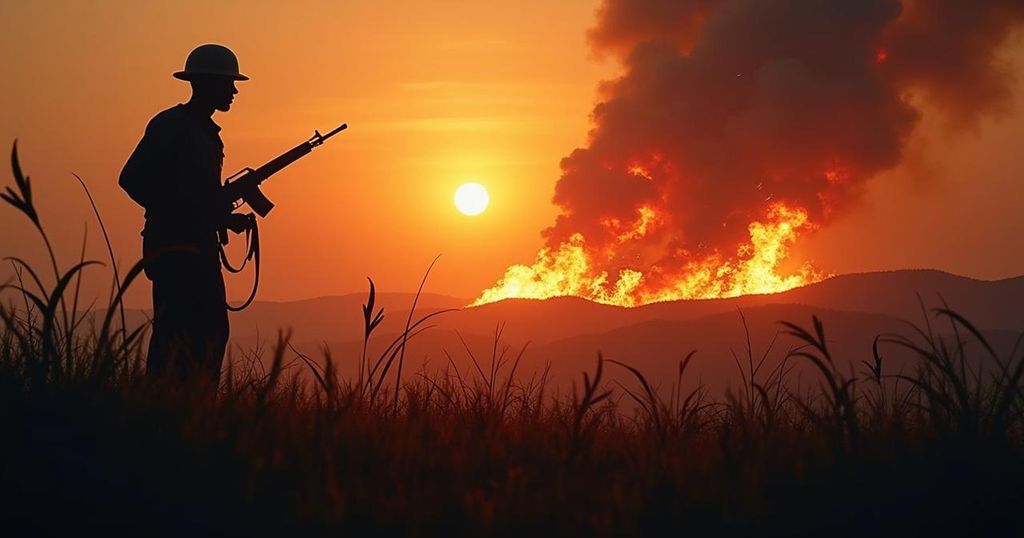The Democratic Republic of the Congo is in a critical humanitarian crisis affecting 25.4 million people due to ongoing conflict and severe health emergencies, including outbreaks of Mpox. The resurgence of the M23 militia has displaced millions and overwhelmed resources. Without immediate action, the situation may worsen, particularly for children facing malnutrition. The country requires substantial funding for humanitarian assistance amidst a deteriorating security environment.
The Democratic Republic of the Congo (DRC) is currently facing a profound humanitarian crisis, with the United Nations health agency indicating that a staggering 25.4 million individuals require urgent assistance. This crisis has been exacerbated by ongoing conflicts in the mineral-rich eastern regions of the country, which have led to extensive violence, mass displacements, and a plethora of health emergencies. Dr. Adelheid Marschang, Senior Emergency Officer at the World Health Organization (WHO), stated that the DRC has the highest number of people in need of humanitarian aid globally, with ongoing displacement leaving many in both chronic and acute states of distress. Currently, there are 7.4 million people displaced internally, primarily due to the resurgence of the M23 separatist movement, which has intensified military conflicts. As a result, water and sanitation infrastructures are crumbling under the pressure, further straining the limited resources available to the affected populations. Alarmingly, around 40.8 million Congolese, equivalent to about 40 percent of the population, are experiencing significant food shortages, with 15.7 million facing severe food insecurity. The WHO has warned that failure to act on these basic needs could result in over one million children suffering from acute malnutrition. Regarding health crises, the DRC has reported various outbreaks, including cholera, measles, and Mpox—a disease that poses a critical threat to public health. Since the beginning of this year, the DRC has documented 20,000 cases and over 1,000 fatalities from Mpox alone, underscoring its deadly potential, particularly among children. The emergence of a dangerous new strain of Mpox in South Kivu raises alarms about the possibility of its spread in overcrowded camps. However, ongoing military operations around these camps hinder health authorities’ abilities to manage the outbreak effectively. Additionally, the DRC is undergoing a severe rights crisis that has largely been overlooked. The Special Representative of the Secretary-General, Bintou Keita, recently characterized the humanitarian emergency in the DRC as one of the most neglected globally, with the 2024 Humanitarian Response Plan aimed at assisting 8.7 million individuals requiring $2.6 billion in funding, of which only 16 percent is currently secured. The withdrawal of the UN Stabilization Mission in DRC (MONUSCO) from South Kivu has further deteriorated the security landscape, raising concerns about a possible escalation of regional conflicts due to the heightened activities of armed groups such as M23. In light of these circumstances, Volker Türk, the UN human rights chief, has drawn attention to the alarming levels of violence and the absence of state authority in vast regions of the DRC, which has led to an increase in brutal attacks and insecurity throughout the country.
The Democratic Republic of the Congo has been embroiled in conflicts for decades, particularly in its eastern regions, which are rich in minerals. This ongoing violence has led to widespread human suffering, including displacement, health emergencies, and food insecurity. The presence and actions of various militia groups, particularly the M23 movement, have exacerbated these conditions, leading to significant humanitarian needs. The WHO has raised concerns about chronic and acute health emergencies in the country, especially in light of various infectious disease outbreaks that are occurring alongside food shortages and mental health crises amongst the affected populations.
In summary, the Democratic Republic of the Congo is grappling with one of the most severe humanitarian crises in the world, marked by vast displacement, dire food shortages, and multiple health emergencies including a significant threat from Mpox. The international community faces critical funding challenges in addressing the needs of the millions affected. The recent withdrawal of UN peacekeeping forces poses additional risks to stability and public health, necessitating urgent and concerted global action to mitigate further suffering in this beleaguered nation.
Original Source: news.un.org







